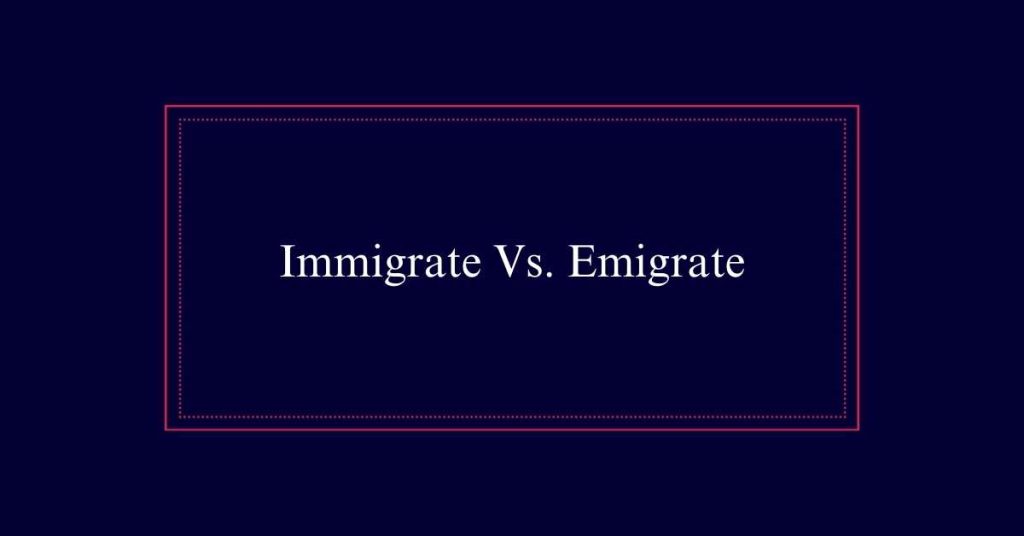Immigrate Vs. Emigrate
‘Immigrate’ and ’emigrate’ are terms often confused, but they have distinct meanings. To immigrate means to enter and settle in a new country, typically involving legal documentation and integration into that society.
For example, moving to the United States from Italy is to immigrate to the U.S. On the other hand, to emigrate means to leave one’s home country to live elsewhere. For instance, leaving Italy to live in the U.S. is to emigrate from Italy. Remember, ‘immigrate’ starts with an “i” for “in,” and ’emigrate’ starts with an “e” for “exit.”
Understanding Immigrate and Emigrate
Understanding the distinction between ‘immigrate’ and ’emigrate’ is essential for accurately describing the movement of people between countries. These terms are often confused but have different meanings.
To immigrate means to enter and settle in a country that is not one’s own. It involves moving to a new place to live.
Conversely, to emigrate means to leave one’s home country to live in another. It focuses on the act of exiting one’s homeland.
For instance, a person who moves from France to Canada has emigrated from France and immigrated to Canada.
Remembering that ‘immigrate’ starts with an ‘i’ for ‘in’ and ’emigrate’ starts with an ‘e’ for ‘exit’ can help differentiate the two.

Defining Immigrate
Immigrate refers to the act of moving to a foreign country to live permanently. This term is used when an individual enters a new country and intends to settle there. Immigrating involves establishing residency, finding employment, and integrating into the local culture and society.
The process may require legal documentation, such as visas or residency permits, depending on the destination country’s immigration laws. For example, Madeline Albright immigrated to the United States from Czechoslovakia. The focus is on the arrival and the intention to build a new life in the chosen country.
Defining Emigrate
Emigrate refers to the act of leaving one’s home country to settle in another. This term is often used to describe the process of exiting a nation with the intent to live elsewhere. Emigration is a significant decision, often influenced by various factors:
- Economic Opportunities: People may emigrate to seek better job prospects and financial stability.
- Political Climate: Unstable political environments can drive individuals to leave their homeland in search of safety and security.
- Personal Reasons: Family reunification, education, or lifestyle changes can also motivate emigration.
Key Differences
The key differences between immigrate and emigrate lie in the direction of movement relative to one’s home country. When a person immigrates, they move into a new country to live. This term focuses on the destination.
Conversely, when a person emigrates, they leave their home country to reside elsewhere. This term emphasizes the origin.
To remember: “immigrate” starts with an “i” for ‘in,’ while “emigrate” starts with an “e” for ‘exit.’ For example, if you move from France to Canada, you emigrate from France and immigrate to Canada.
Usage of Immigrate
Entering a new country to reside permanently is described by the term ‘immigrate.’ This process involves moving to a foreign nation with the intention of making it one’s new home. Usage of the term ‘immigrate’ is common in discussions about international relocation and policies.
Here are some key points to understand:
- Legal Status: Immigrating usually requires obtaining legal permission such as visas or residency permits.
- Cultural Integration: Immigrants often need to adapt to a new culture, language, and societal norms.
- Economic Impact: Immigration can affect both the economy of the host country and the individual’s financial opportunities.
Usage of Emigrate
Leaving one’s homeland to settle in a new country is described by the term ’emigrate.’ Emigration focuses on the act of departing from one’s native country. It is often driven by factors like economic opportunities, political conditions, or family reunification.
For example, if someone leaves Spain to live in Canada, they emigrate from Spain. It is important to use ’emigrate’ correctly to avoid confusion. Remember, ’emigrate’ emphasizes the departure point. This term is used when highlighting the origin rather than the destination. Understanding this distinction guarantees clear communication, particularly in contexts involving migration policies, historical narratives, or personal stories.
Historical Examples
Historical narratives are rich with examples of individuals who chose to emigrate from their homelands to seek new opportunities or escape adverse conditions. These migrations have shaped the course of history, influencing cultures and economies worldwide.
Consider these notable instances:
- Albert Einstein: In 1933, Einstein emigrated from Germany to the United States to escape the oppressive Nazi regime. His move had a profound impact on science and the global intellectual community.
- The Pilgrims: In 1620, the Pilgrims emigrated from England to North America aboard the Mayflower, seeking religious freedom. This journey laid the foundation for future settlements.
- Winston Churchill’s Ancestors: In the 18th century, the ancestors of Winston Churchill emigrated from England to the American colonies, demonstrating early patterns of transatlantic migration.
Memory Aids
Remembering the difference between ‘immigrate’ and ’emigrate’ can be made easier with simple mnemonic devices.
Think of the word ‘immigrate’ as starting with an ‘I’ for ‘in.’ This reminds you that immigrate means moving into a new country.
Conversely, ’emigrate’ starts with an ‘E’ for ‘exit.’ This means leaving your home country to settle elsewhere.
Another helpful trick is to link ‘immigrate’ with ‘in-move’ and ’emigrate’ with ‘exit-move.’ These associations can aid in recalling the correct usage of each term.
Common Mistakes
Many people often confuse ‘immigrate’ and ’emigrate’ due to their similar meanings and spelling. These common mistakes can lead to misunderstandings:
- Incorrect Usage in Context:
A person might say, ‘He emigrated to the United States,’ when they should say, ‘He immigrated to the United States.’ ‘Immigrate’ should be used when referring to entering a new country.
- Interchanging Terms:
Some might use ‘immigrate’ and ’emigrate’ interchangeably. Remember, ’emigrate’ means leaving one’s home country, while ‘immigrate’ means entering and settling in a new one.
- Spelling Errors:
Simple spelling errors can change meanings. ‘Immigrate’ starts with ‘i’ for ‘in,’ and ’emigrate’ starts with ‘e’ for ‘exit.’
Practical Applications
Understanding the difference between ‘immigrate’ and ’emigrate’ is essential for clear communication in legal, academic, and everyday contexts. In legal documents, accurate use of these terms guarantees the correct interpretation of someone’s migration status. For instance, an immigration lawyer must differentiate between clients who are immigrating to a country and those who are emigrating from it.
Academically, research papers on migration trends require precise language to maintain credibility and clarity. In everyday use, understanding these terms helps individuals accurately describe their or others’ movements. For example, saying ‘I emigrated from France’ correctly implies you left France, while ‘I immigrated to Canada’ means you moved into Canada.
Clear usage prevents misunderstandings and enhances the accuracy of communication.







